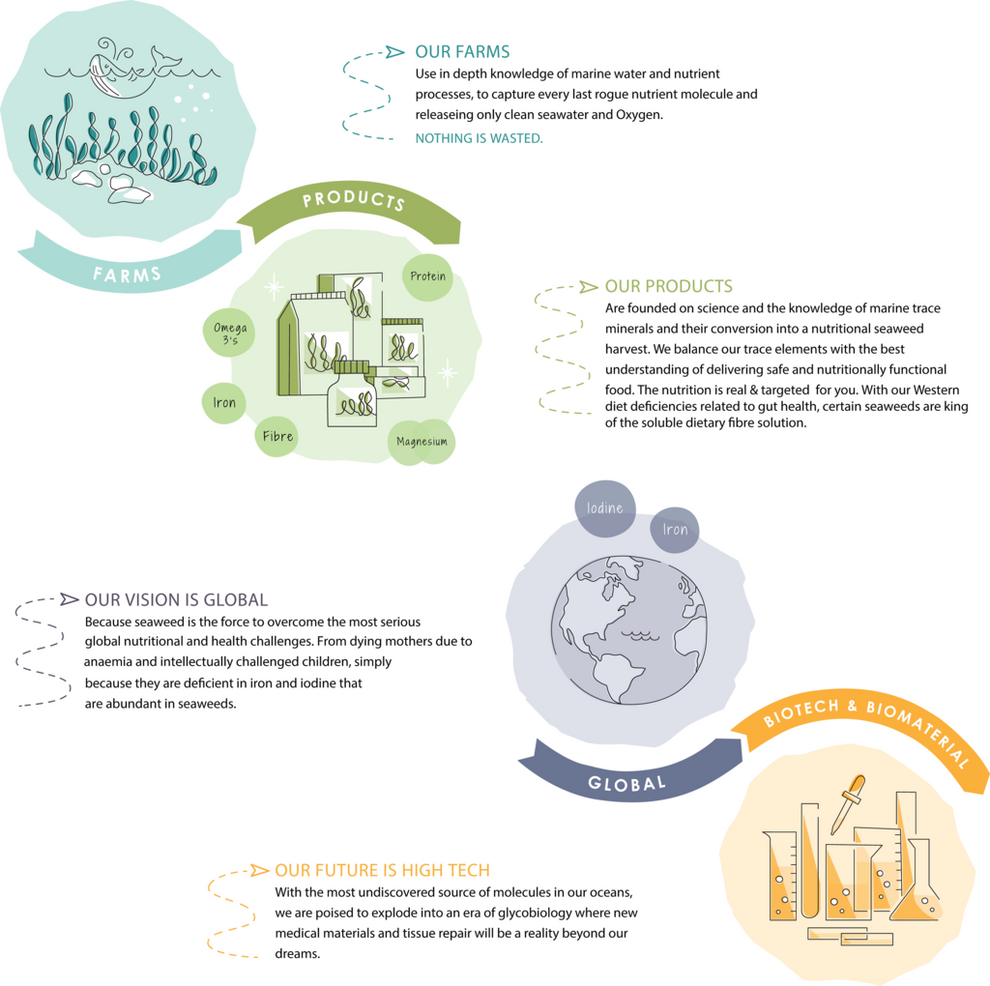Be a part of the game change through seaweed
You can create the future today. Not with blue sky plans about what could be done, should be done, one day we can do that. Do it today with PhycoHealth, bringing you over 20 years of research and science of seaweeds to help you make the choice in what you eat, how you care for your skin, and how you choose lifelong wellness. Today!
OUR STORY TAKES PLACE ON THE PRISTINE SOUTH COAST OF NEW SOUTH WALES, AUSTRALIA.
It is here that we capture sun and sea to grow unique local seaweed and help to reduce the carbon footprint of neighbouring food processors. In the Shoalhaven, large-scale food production systems release CO2, nitrogen, phosphorus and other nutrients.
We capture these and harness their nutritional power for our seaweed farm, returning and keeping them in the food chain, closing the loop in a sustainable industrial ecology system.
SEAWEED IS PACKED FULL OF SUSTAINABLY SOURCED CRITICAL NUTRIENTS.
⚒️ Land-based Mineral Sourcing: A Costly and Extractive Process
Many trace minerals used in food fortification and supplements are mined, often with substantial environmental and energy costs:
Commonly mined as hematite (Fe₂O₃) or magnetite (Fe₃O₄), then processed into ferrous sulfate or fumarate for supplements. Mining iron ore contributes to habitat destruction and emits significant CO₂.
Typically extracted from dolomite rock or evaporated seawater, but industrial processing (e.g., electrolysis or thermal reduction) is energy-intensive and not circular.
Rare in soils and sourced mostly as a byproduct of copper mining. It’s costly to extract, often imported, and regions like China or the U.S. dominate production.
Often derived from brine pools or oil and gas field effluent, particularly in Chile and Japan. Extraction involves chemical processes and fossil fuel infrastructure.
Heavily mined and associated with toxic tailings and acid mine drainage, often needing chemical chelation to make them bioavailable in food products.
🌊 Seaweed: A Natural, Regenerative Mineral Filter
While most trace minerals in supplements come from mines, our seaweed grows them. No bulldozers, no acid leachate—just sunlight, seawater, and a little bit of magic.
Green seaweed like our Species 84 absorbs a well balanced matrix of trace elements directly from seawater—no mining, no refining, no fossil fuels.
Our seaweed bioconcentrates minerals at safe levels, delivering natural molecular complexes (e.g., sulfated polysaccharides bound to iron or iodine) that are more bioavailable and potentially less irritating to the gut than synthetic forms.
Our roduction is non-extractive: our seaweed farming technology can regenerate nutrients, re-oxygenate the ocean, and leave no tailings, no emissions, no land degradation.

Sustainability and Skincare
Our Skincare & Sustainability
The beauty industry generates over 120 billion units of packaging each year, much of it ending up in landfills or oceans. Most of this is plastic, and only a fraction is ever truly recycled. At PhycoHealth, we believe it’s time to do things differently.
Sustainability isn’t a checkbox—it’s a continuous journey. We’ve built our skincare range with a commitment to conscious choices at every level, from ingredients to packaging.
INGREDIENTS
Our key moisturising and cleansing agents—caprylic/capric triglyceride, sodium cocoyl isethionate, cocamidopropyl betaine, sodium lauroyl sarcosinate, and glycerin—are all derived from coconut oil, not palm oil. While many cosmetic ingredients are sourced from large suppliers with complex supply chains, we actively review and refine our sourcing for greater transparency and responsibility.
We also choose olive-derived squalane—never animal-based, and certainly not from sharks. And our hero ingredient, Phyaluronic®, is the first plant-based alternative that performs like hyaluronic acid—offering deep hydration, skin affinity, and sustainability.
What’s more, the cultivation of seaweed used in our Phyaluronic production re-oxygenates over 1,500 litres of seawater per product. That’s a benefit most skincare products can’t claim. We're proud to lead in this space—and we’ll be sharing more soon about how ocean deoxygenation affects our planet, and why seaweed offers a powerful solution.

